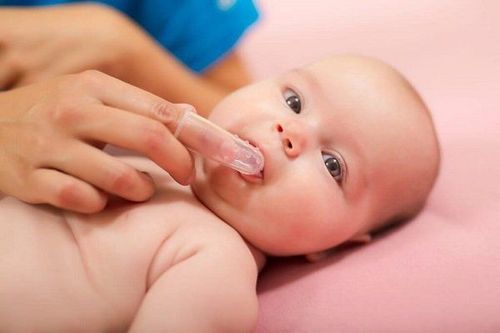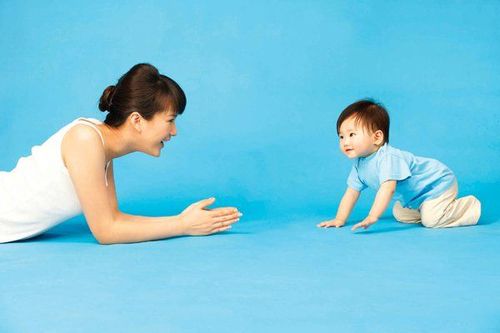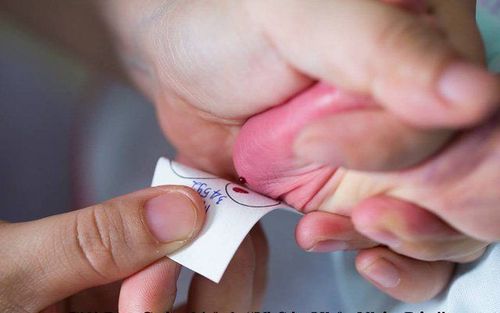This is an automatically translated article.
The article is professionally approved by Master, Doctor Truong Thanh Tam - Department of Pediatrics - Neonatology - Vinmec Danang International General HospitalHere are important information to help you better understand your 38-week-old newborn. You need to keep track of your baby's development and milestones like talking, walking, growth, memory abilities of your 38-week-old baby and more.
1. 38 weeks old milestone
Baby's memory capacity increases sharply every day! You may notice your child getting excited when he and you sing a familiar song together. Your child may even try to move your hand away when you play peek-a-boo. This is an exciting period in your baby's development, as he's getting closer and closer to the 10-month mark and big changes are taking place.
Parents can realize, during this stage, the child's cognitive development and memory are very good about the daily habits that you perform. At this stage, your baby is more attuned to his surroundings and has the ability to predict what will happen next.
Children's memory is now sharp enough to help them know and understand that when they see you reading, it can signal that they are about to take a bath and go to bed. Parents should keep the following in mind:
Keep naps/bedtime on a consistent schedule: Parents try not to change the established bedtimes for children at this time, especially If you want your baby to continue to sleep through the night. Pay attention to routines: Whether it's simple bedtime routines like reading to your baby or cuddling before bed, create a simple routine that your child can anticipate. Designed to help you and your baby go through the transitions in your baby's development more easily.

Cha mẹ nên cho trẻ đi ngủ theo một lình trình nhất định và khoa học
It's really the little things that can make a big difference in your daily life with your growing baby!
1.1. Children increase their vocabulary Your baby's vocabulary is growing rapidly during this period. Even if your child can't talk yet, he certainly understands more words than he speaks. You can get a better understanding by asking your child to point to something familiar, such as a ball or a favorite toy, or by asking them to do something like, "Get me your shoes, please. is that Okay?." Your baby's comprehension will continue to outstrip her ability to speak for months and even years to come because the anatomical development of the mouth, tongue, and larynx will be slower than the baby's cognitive ability. increasing, so to combine words such as nouns and verbs in the correct order takes a long time. However, children may find other ways to express their needs, by pointing, bringing you things, or even using baby sign language.
During this time, your baby will also become more aware of vertical space and getting taller can be scary. For example, a child may feel uncomfortable sitting in a high chair. This fear of a baby can show up as he learns to stand and walk and when he falls repeatedly. When the child is more stable on his two feet, the possibility of falling will not worry him much. But then, you may have to deal with a "danger" who has taken your kitchen cabinets all by himself.
1.2. Caring for your baby's teeth By 9 months old, your baby may have a few small teeth in his mouth. First will be the two lower front teeth, then the four upper teeth, then the two bottom incisors. The molars and canines will come in last. If you don't regularly brush your child's teeth, it's best to start now, especially when your baby starts solids and food can get stuck between the teeth. You don't necessarily need baby toothpaste or even a toothbrush. You should note, do not use adult toothpaste on children before 2 years of age, because these toothpastes contain fluoride that young children should not swallow. Instead, try scrubbing your teeth and gums with a wet washcloth. Or use a special infant brush, which is a textured rubber cap that fits the tip of your index finger and allows you to feel your baby's teeth during cleaning. Most experts recommend brushing your teeth once a day at this point, ideally right after your last meal of the day.
To keep the baby's teeth growing healthy, parents avoid giving the baby milk at bedtime. Formula or even breast milk will cause sugary liquids to flow into your mouth and coat your teeth, promoting bacteria growth that can cause tooth decay.

Chăm sóc răng miệng của trẻ sơ sinh 38 tuần tuổi sau sinh là việc làm cần thiết
2. Mother 38 weeks after giving birth
By this point, you may be struggling with balancing daily chores between housework, work at work, and babysitting. So how do you deal with the stress and balance between work and home life? Here are some tips to help you boost your energy levels and keep a positive attitude:
Drink enough water: Did you know dehydration is one of the biggest contributors to fatigue, so make sure you should get at least 8-10 cups of filtered water per day. You can add cucumber and mint or lemon juice and a little apple cider vinegar to the water to provide more vitamins for the body. Exercise: Studies show that exercise increases positive energy in the body. How can you exercise while still babysitting? You can dress the baby and also the baby to walk. Walking while holding your baby can help boost your calorie-burning efforts. Or, you can walk or run with a stroller. Get enough sleep: It can be difficult when you need time to care for a newborn, but you can get enough sleep by putting your baby to bed before 9pm every night. This will allow you to be fully awake and energized for the next day no matter how many times your baby wakes up. Use caffeine: A dark chocolate or two, a glass of kombucha, or a golden milk latte can help keep you awake when you need it. You should understand that there are small things you can do to help ease the day-to-day happenings that can make a big difference. And don't be afraid to ask for help from friends and family. If you have difficulties in the process of raising children, you should seek advice from specialists..
Children need to provide enough elemental zinc/day for them to eat well, reach the correct height and weight and exceed the standard. Zinc plays a role in affecting most biological processes taking place in the body, especially the breakdown of nucleic acids, proteins... Organs in the body when zinc deficiency can lead to a There are a number of diseases such as neurological disorders, irritability, etc. Therefore, parents need to learn about the role of zinc and guide them to appropriate zinc supplements for their children.
In addition to zinc, parents also need to supplement their children with other important vitamins and minerals such as lysine, chromium, B vitamins,... errands.
Please regularly visit Vinmec.com website and update useful information to take care of your baby and family.
References: parents.com, mamanatural.com














